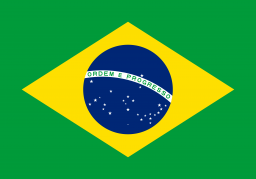Main Container Ports in Brazil
LEARN HUB

Main Container Ports in Brazil

Rio Grande Port
Address: Hondrio Bicalho Ave, W/N, Mailbox 198, Rio Grande, RS 96201-020, Brazil
Port Authority: Superintendencia do Porto de Rio Grande
UN/LOCODE: BRRIG
Port Type: Seaport
Port Size: Medium
Terminal: Yes
The Rio Grande Port, located in Brazil, serves as a crucial maritime gateway for trade and commerce. Situated along the Rio Grande River in the southern state of Rio Grande do Sul, it primarily operates as a deep-water seaport, accommodating vessels of varying sizes.
The port boasts modern facilities for cargo handling, including terminals for containers, bulk cargo, and liquid bulk, facilitating efficient import and export activities. With its strategic location and advanced infrastructure, the Rio Grande Port plays a significant role in bolstering Brazil’s international trade network.

Porto Alegre Port
Address: Av Maua 1050 Centro, Porto Alegre, RS 90010-110, Brazil
Port Authority: Administracao do Porto de Porto Alegre
UN/LOCODE: BRPOA
Port Type: Seaport
Port Size: Medium
Terminal: Yes
Porto Alegre Port is a major seaport located in Porto Alegre, Brazil. As one of the country’s key maritime hubs, it facilitates significant commercial activities, particularly in shipping and trade. Situated along the Guaíba River, it offers strategic access to the Atlantic Ocean, enhancing its importance in regional and international maritime transportation networks.
The port boasts modern facilities equipped to handle various cargo types, including containers, bulk cargo, and petroleum products. Its efficient operations and strategic location contribute to its role as a vital economic gateway for Brazil.

Itajai Port
Address: Rua Blumenau, 05, Itajai, Santa Catarina CEP 88.305-101, Brazil
UN/LOCODE: BRITJ
Port Type: Seaport
Port Size: Medium
Terminal: Yes
Itajai Port is a major seaport located in the state of Santa Catarina, Brazil. Positioned along the Atlantic coast, it serves as a crucial hub for maritime trade in the region. As a multi-purpose port, Itajai accommodates various types of cargo, including containers, bulk, and general cargo.
The port boasts modern facilities and efficient infrastructure, facilitating smooth cargo handling operations. Its strategic location, well-connected transportation networks, and deep-water access contribute to its significance in Brazil’s maritime industry, fostering international trade and economic growth.

Sao Francisco Port
Address: Av Eng Leite Ribeiro 782, Bairro Centro, Sao Francisco do Sul, SC 89240-000, Brazil
Port Authority: Administracao do Porto de Sao Francisco do Sul
UN/LOCODE: BRSFS
Port Type: Seaport
Port Size: Small
Terminal: Yes
Sao Francisco Port is a key maritime facility situated in Brazil. As a vital port in the region, it serves as a crucial hub for both domestic and international trade activities. Strategically located along the coastline, it boasts modern facilities equipped to handle various cargo types, including containers, bulk goods, and petroleum products.
With efficient logistics infrastructure and deep-water access, Sao Francisco Port facilitates seamless transportation of goods, contributing significantly to Brazil’s economy and global trade networks.

Paranagua Port
Address: Rua Antonio Pereira, 161, Paranagua, PR 83221-030, Brazil
Port Authority: Administracao dos Portos de Paranagua e Antonina
UN/LOCODE: BRPNG
Port Type: Seaport
Port Size: Medium
Website: www.portosdoparana.pr.gov.br
Terminal: Yes
Paranagua Port, located in Paraná, Brazil, is a vital maritime hub on the country’s southeastern coast. As one of the largest ports in Brazil, it primarily handles bulk cargo such as grains, minerals, and petroleum products.
With its strategic location and extensive infrastructure, including terminals equipped with modern handling facilities, Paranagua Port serves as a crucial gateway for both domestic and international trade. Its efficiency and capacity contribute significantly to Brazil’s economy, facilitating the transportation of goods to various destinations worldwide.

Santos Port
Address: Companhia Docas do Estado de Sao Paulo (CODESP), Avenida Rodrigues Alves s/n, Santos, Sao Baulo 11015-900, Brazil
Port Authority: Port of Santos Port Authority
UN/LOCODE: BRSSZ
Port Type: Seaport
Port Size: Medium
Terminal: Yes
Santos Port, located in Santos, Brazil, is the largest port in Latin America and a crucial hub for trade in the region. As a major seaport, it facilitates both domestic and international maritime commerce, handling various goods such as containers, bulk liquids, and solid bulk cargo.
The port boasts extensive facilities including terminals equipped with modern handling equipment, warehousing, and logistical services. Its strategic location near São Paulo, Brazil’s economic powerhouse, enhances its significance as a vital gateway for imports and exports, contributing significantly to Brazil’s trade economy.

Rio De Janeiro Port
Address: Avenida Rodrigues Alves, n 20, Praca Maua, Rio de Janeiro, RJ CEP 20081-250, Brazil
Port Authority: Companhia Docas do Rio de Janeiro (CDRJ)
UN/LOCODE: BRRIO
Port Type: Seaport
Port Size: Medium
Website: www.portosrio.gov.br
Terminal: Yes
Rio de Janeiro Port is a major maritime facility located in Brazil, serving as a crucial hub for international trade and commerce. Situated along the southeastern coast of Brazil, it offers extensive facilities for handling various cargo types, including containers, bulk commodities, and petroleum products.
The port’s strategic location provides easy access to the Atlantic Ocean, facilitating efficient transportation routes to both domestic and global markets. Equipped with modern infrastructure and advanced logistics services, Rio de Janeiro Port plays a pivotal role in supporting Brazil’s economy by facilitating seamless import and export activities.

Vitoria Port
Address: Av. Getulio Vargas, 556, Vitoria, ES CEP 29.020-030, Brazil
Port Authority: Companhia Docas do Espirito Santo (CODESA)
UN/LOCODE: BRVIX
Port Type: Seaport
Port Size: Medium
Website: www.portodevitoria.com.br
Terminal: Yes
Vitoria Port, situated in the southeastern region of Brazil, serves as a vital maritime hub for the country’s economy. This port primarily handles cargo, including bulk commodities like iron ore and agricultural products. Its strategic location provides easy access to major transportation routes, facilitating efficient trade both domestically and internationally.
Vitoria Port boasts modern facilities equipped to handle various types of vessels, offering extensive storage and handling capabilities. With its significant role in Brazil’s trade network, Vitoria Port plays a crucial part in fostering economic growth and global connectivity.

Salvador Port
Address: Av. da Franca, 155 I, Comercio, Salvador, Bahia CEP 40.010-000
Brazil
Port Authority: Companhia das Docas do Estado da Bahia (CODEBA)
UN/LOCODE: BRSSA
Port Type: Harbor
Port Size: Medium
Website: www.codeba.com.br
Terminal: Yes
Salvador Port, located in the city of Salvador, Brazil, serves as a vital maritime hub in the region. As one of Brazil’s busiest ports, it handles various cargo types, including containers, bulk commodities, and petroleum products. Situated strategically along the coast, Salvador Port boasts modern facilities equipped to accommodate large vessels, facilitating efficient cargo handling operations.
Its strategic location enhances connectivity to domestic and international markets, contributing significantly to Brazil’s trade activities. With its diverse cargo handling capabilities and strategic position, Salvador Port plays a crucial role in supporting the country’s economic growth and maritime trade.

Suape Port
UN/LOCODE: BRSUA
Terminal: Yes
Suape Port, located in the Brazilian state of Pernambuco, is a major maritime hub in South America. As a deep-water port, it accommodates various types of vessels, including container ships, bulk carriers, and oil tankers. Suape Port offers extensive facilities, including terminals for containers, liquid bulk, and solid bulk cargo, as well as specialized terminals for handling chemicals and petroleum products.
With its strategic location and modern infrastructure, Suape Port serves as a crucial gateway for international trade, particularly for Brazil’s northeastern region, facilitating the movement of goods and fostering economic development.

Natal Port
Address: Av. Eng Hildebrando de Gois, 220 – Ribeira, Natal, RN, Brazil
Port Authority: Companhia Docas do Rio Grande do Norte – CODERN
UN/LOCODE: BRNAT
Port Type: Harbor
Port Size: Small
Website: www.codern.com.br
Terminal: Yes
Natal Port, located in Brazil, serves as a significant maritime gateway. Situated along the northeastern coast, it operates as a crucial hub for both commercial and leisure vessels. With its strategic position, Natal Port facilitates trade activities, handling various cargo types efficiently.
Equipped with modern facilities and infrastructure, including container terminals and warehousing capabilities, it supports seamless logistics operations. The port’s strategic location and advanced amenities contribute to its role in enhancing regional connectivity and promoting economic development in Brazil.

Pecem Port
UN/LOCODE: BRSUA
Terminal: Yes
Pecem Port, situated in Brazil, is a key maritime hub facilitating trade and logistics operations. Operating as a multi-purpose port, it accommodates various cargo types, including containers, bulk, and general cargo. Located strategically in the northeast region of Brazil, it serves as a gateway for international trade, connecting South America with global markets.
Pecem Port boasts modern facilities equipped with advanced technology to handle cargo efficiently. Its strategic location, combined with state-of-the-art infrastructure, positions it as a vital node in Brazil’s maritime trade network, facilitating economic growth and development in the region

Itaqui Port
Address: Av. dos Portugueses s/n, Itaqui, Sao Luis CEP: 65085-370, Brazil
Port Authority: Empresa Maranhense de Administracao Portuaria (EMAP)
UN/LOCODE: BRITQ
Port Type: Seaport
Port Size: Medium
Terminal: Yes
Itaqui Port, located in Brazil, serves as a vital maritime gateway primarily for the export of commodities like grains and minerals. Situated in the state of Maranhão, it boasts extensive facilities for handling various cargo types, including bulk and containerized goods. As a key port in the region, Itaqui facilitates international trade, connecting Brazil to global markets efficiently.
Its strategic location and modern infrastructure contribute to its significance in Brazil’s maritime trade network, supporting economic growth and development in the surrounding region.

Vila do Conde Port
Address: Endereco Rodovia PA-481, Km 2,3, Vila do Conde, Barcarena, Para CEP: 68.447-000, Brazil
Port Authority: Companhia Docas do Para – Autoridade Portuaria
UN/LOCODE: BRVLC
Port Type: Pier, Jetty or Wharf
Port Size: Small
Terminal: Yes
Vila do Conde Port is a key maritime facility located in Brazil. Situated in the state of Rio de Janeiro, it serves as a vital hub for both domestic and international trade. The port primarily handles various types of cargo, including containers, bulk, and general cargo. Its strategic location near major shipping routes enhances its accessibility and efficiency.
Vila do Conde Port boasts modern facilities and infrastructure, equipped with advanced handling equipment to facilitate smooth operations. With its strategic significance and efficient services, the port plays a crucial role in supporting Brazil’s economic activities and global trade.

Manaus Port
Address: Rua Marques de Santa Cruz, no25 – Centro, Manaus, AM 69005 050, Brazil
Port Authority: Port of Manaus
UN/LOCODE: BRMAO
Port Type: River Port
Port Size: Medium
Terminal: Yes
Manaus Port is situated in the heart of the Amazon rainforest in Brazil. It serves as a vital inland port along the Rio Negro, facilitating trade and transportation in the region. As a key access point to the Amazon basin, it primarily handles cargo such as timber, minerals, and agricultural products.
The port’s strategic location connects the remote Amazonian region to domestic and international markets. It boasts modern facilities for cargo handling and storage, contributing significantly to Brazil’s economic activity and fostering trade links with other regions of the world.
When it comes to importing Indonesian furniture, it’s crucial to understand the customs clearance process. This involves complying with regulations for importing wood furniture and working with a reputable customs broker for Indonesian imports. Navigating the import permit and tariffs set by Customs is essential for a smooth importing process.
Read our Guide to Importing from Indonesia for more info.
FURTHER READING
FURNITURE PAGES IN SOUTH AMERICA
YOUR SUPPLY PARTNER IN INDONESIA
Looking for new products for your store or next project?
With around 12,000 products register today to see our full range. We offer a broad range of indoor and outdoor furniture.
Useful link: Indonesian Ministry of Trade
